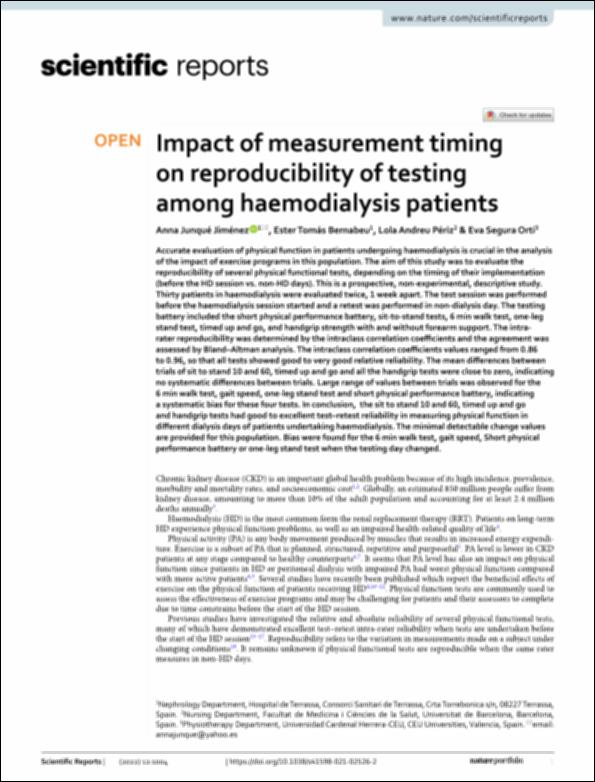Por favor, use este identificador para citar o enlazar este ítem:
http://hdl.handle.net/10637/14448Impact of measurement timing on reproducibility of testing among haemodialysis patients
| Título : | Impact of measurement timing on reproducibility of testing among haemodialysis patients |
| Autor : | Junqué Jiménez, Anna Tomás Bernabeu, Ester Andreu Periz, Lola Segura Ortí, Eva |
| Materias: | Hemodialysis.; Kidneys - Diseases - Patients - Functional assessment.; Riñones - Enfermedades - Pacientes - Evaluación funcional.; Hemodiálisis. |
| Editorial : | Springer Nature |
| Citación : | Junqué Jiménez, A., Tomás Bernabeu, E., Andreu Périz, L. & Segura Ortí, E. (2022). Impact of measurement timing on reproducibility of testing among haemodialysis patients. Scientific Reports, vol. 12, i. 1 (19 jan.), art. 1004. DOI: https://doi.org/10.1038/s41598-021-02526-2 |
| Resumen : | Accurate evaluation of physical function in patients undergoing haemodialysis is crucial in the analysis of the impact of exercise programs in this population. The aim of this study was to evaluate the reproducibility of several physical functional tests, depending on the timing of their implementation (before the HD session vs. non-HD days). This is a prospective, non-experimental, descriptive study. Thirty patients in haemodialysis were evaluated twice, 1 week apart. The test session was performed before the haemodialysis session started and a retest was performed in non-dialysis day. The testing battery included the short physical performance battery, sit-to-stand tests, 6 min walk test, one-leg stand test, timed up and go, and handgrip strength with and without forearm support. The intrarater reproducibility was determined by the intraclass correlation coefficients and the agreement was assessed by Bland–Altman analysis. The intraclass correlation coefficients values ranged from 0.86 to 0.96, so that all tests showed good to very good relative reliability. The mean differences between trials of sit to stand 10 and 60, timed up and go and all the handgrip tests were close to zero, indicating no systematic differences between trials. Large range of values between trials was observed for the 6 min walk test, gait speed, one-leg stand test and short physical performance battery, indicating a systematic bias for these four tests. In conclusion, the sit to stand 10 and 60, timed up and go and handgrip tests had good to excellent test–retest reliability in measuring physical function in different dialysis days of patients undertaking haemodialysis. The minimal detectable change values are provided for this population. Bias were found for the 6 min walk test, gait speed, Short physical performance battery or one-leg stand test when the testing day changed. |
| Descripción : | Este artículo se encuentra disponible en la siguiente URL: https://www.nature.com/articles/s41598-021-02526-2 |
| URI : | http://hdl.handle.net/10637/14448 |
| Derechos: | http://creativecommons.org/licenses/by/4.0/deed.es |
| ISSN : | 2045-2322 (Electrónico) |
| Idioma: | es |
| Fecha de publicación : | 19-ene-2022 |
| Centro : | Universidad Cardenal Herrera-CEU |
| Aparece en las colecciones: | Dpto. Enfermería y Fisioterapia |
Los ítems de DSpace están protegidos por copyright, con todos los derechos reservados, a menos que se indique lo contrario.


